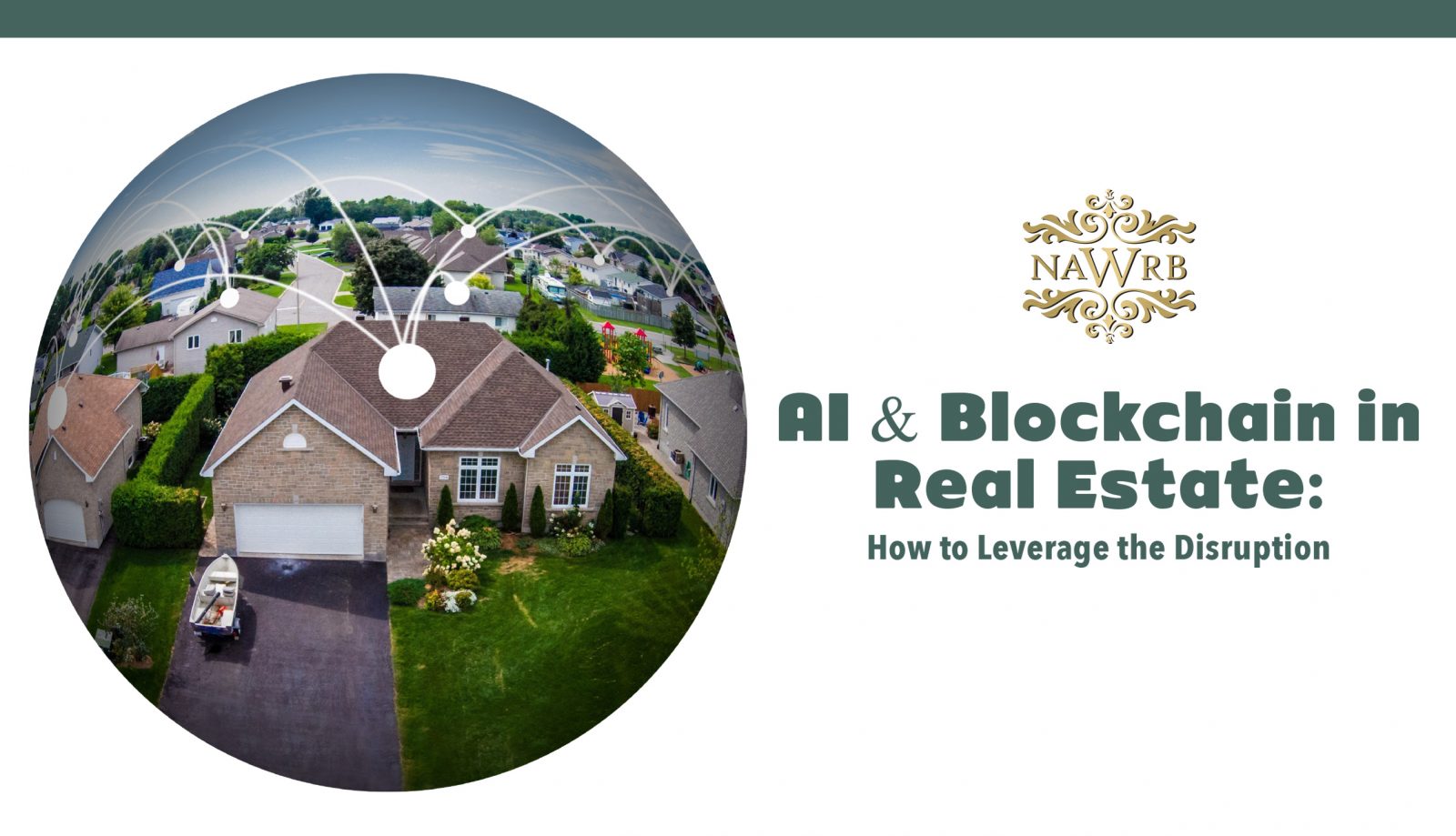Artificial Intelligence (AI) and Blockchain are emerging technologies that are impacting the way industries conduct business, especially in real estate. Not much is known about blockchain to the general public besides its association with bitcoin, and most people associate AI with either Siri or Alexa. However, more professionals in the housing ecosystem are increasing their focus on these new trends as they will significantly alter the way businesses operate and interact with their customers and clients.
In this article, we’ll get you up to speed on how blockchain and AI will alter the industry, especially real estate, and how companies can stay afloat along this new current of technological development.
 Artificial Intelligence (AI)
Artificial Intelligence (AI)
Discussions about how AI will alter the workforce as we know it is a hot topic among thought leaders, including in the housing and real estate ecosystem. While some fear that improvements in machine learning and cognitive intelligence will present a threat to jobs, which is certainly an important concern, others see AI as a helpful tool for real estate professionals.
When hearing the term “AI,” people often think of chatbots and Siri or Alexa. However, experts see AI as having greater potential as a common helper in the real estate industry, including being able to communicate with buyers in an intelligent manner and identify important signals for property regulations such as RegTech.
Technology can assist the industry in property management, application processing and data synthesizing so that agents and brokers can focus on connecting with clients and helping them with the emotional process of buying or selling a home.
Here are some of the ways real estate professionals can utilize AI to improve their operations & increase their business growth:
- For property management, advanced machine learning can streamline everyday processes for tenants, property managers and landlords by helping find suitable tenants, locate vendors and provide alerts for routine maintenance and management tasks.
- Increase the number of recommendations your clients can choose from through AI. Agents can convert their knowledge of a client’s wants into data an algorithm can use to search and find a higher number of matches at a faster rate.
- AI can provide virtual tours for interested homebuyers and answer simple technical questions about the property on behalf of the agent, such as square footage, questions about the lease and more through 24/7 chat boxes. More nuanced questions can be transferred to the agent.
- Agents can maintain long-term relationships with their clients, for when they need help moving, selling their property or even buying multiple properties in the future, through AI-based customer relationship management (CRM) systems.
These are just a few of the ways AI is being developed into the way real estate professionals conduct their business. AI can be a helpful tool that can make everyday tasks more efficient and provide assistance to clients at a moment’s notice rather than a replacement for the agent themselves. It’s important to remember that AI is not without flaws. Some worry that AI creators and users will include their own biases into new technology, causing more roadblocks and harm to minorities.
Innovators are working to make AI great at problem-solving, automatic processing, data collecting and so on, but being an agent or broker requires skills AI does not have: the expert advice of a professional who has worked in the field for over 20 years, the ethics to makes sure AI is used responsibly, the ability to listen and understand a client’s needs, the intuition to know when a property is a good fit or deal, and the empathy to sympathize and provide moral support when homebuyers get cold feet or things don’t go according to plan.
 Blockchain
Blockchain
Blockchain is an emerging technology that is impacting the way industries conduct business, especially in real estate. Not much is known about blockchain to the general public besides its association with bitcoin. While real estate professionals should pay attention to this new trend as it will significantly change transactions and data sharing, it will not make their careers obsolete. Agents have the invaluable tool of building relationships and empathy, which are pivotal to success in the industry. Blockchain is merely a helpful addition to their toolbox.
Blockchain is a series of computers, ranging from thousands to millions in number, which are able to simultaneously keep record of the same event or transaction in a ledger that is publicly viewable. Bitcoin is an application of blockchain. The transaction of buying bitcoin with cash is witnessed by these computers and validates a person’s ownership of the bitcoin when she attempts to sell the bitcoin for cash later.
The benefits of blockchain technology are tenfold, and it can be applied for any process that involves a transaction, record-keeping or agreement. First, it keeps sensitive information safe: each record is encrypted and the ledger is difficult, if not impossible, to hack. Second, every computer’s record provides a consensus of the validity of any transaction. Third, blockchain allows two or more parties to engage in a transaction without the need of a middleman.
In terms of real estate, blockchain will make property data more secure and accessible to the public, and it will make transactions efficient and safe. This increases accessibility of data integral to home buying and selling, and ensures independent industries are held accountable for sound business practices.
The multiple listing service (MLS)— used to store information regarding clients, contracts, and more— is not centralized, difficult to access and is often out of date. With blockchain, a nationwide database can be made that offers centralized and accessible property information.
Blockchain will drive an increase in smart contracts, which allows contracts, escrows, property records and more to be completed and financial transactions to occur without the need of title companies or attorneys. Forbes analysts predict that home buying and home selling might become as easy as using a shopping cart on a website. Blockchain has the capacity to ensure the homebuyer receives the deed or title, while the seller takes home the profit through cryptocurrency.
Some fear that these changes will make certain real estate professions unnecessary, but this is false. Real estate agents are still an integral part of the home buying process as a dependable source of knowledge, advice and emotional support for clients during this important decision.
Agents are adept at handling hiccups in the buying process, such as when a client suffers a traumatic loss, loses their job or gets cold feet. As human beings, they can relate to these troubles and provide practical solutions, while computers cannot. Blockchain is not a replacement for real estate professionals; it is only a helpful tool for helping agents and brokerages serve their clients with the utmost care and efficiency.
NAWRB is dedicated to helping industry professionals utilize technology in the best way possible in their careers and personal lives. Our trademark Technology Human Balance® delivers information on how technology is disrupting the housing and real estate ecosystem, as well as in our daily lives, and how we can properly leverage this dynamic tool in the way we live and work. AI Technology with the Human Touch is the Perfect Balance.

 Login
Login

